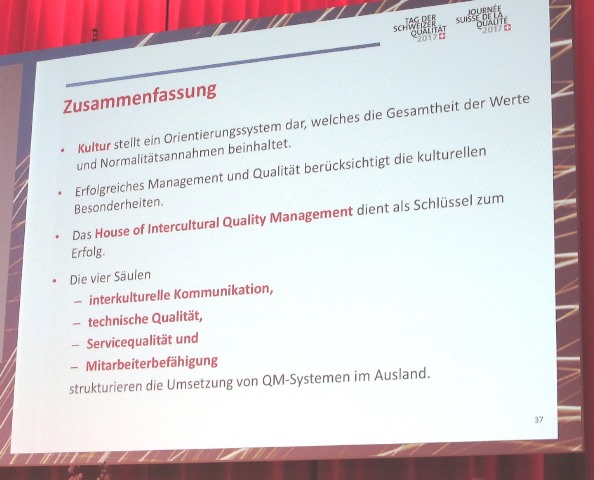Quality is when the expectation is fulfilled
Continuing education providers are fundamentally committed to quality, according to the summary of the first national conference on quality in continuing education. Nevertheless, it is not only the new Continuing Education Act that brings difficulties.

Laws are there to regulate things and define responsibilities. But sometimes they first create a need for further clarification. This is the case with the new Continuing Education Act, which has been in force since 1 January. This first national law defines the framework conditions for the management and promotion of continuing education by the Confederation and the cantons. It also makes a statement on quality.
In principle, the law places responsibility for quality in the hands of the providers. In the case of publicly funded continuing education, however, the law requires that the Confederation and the cantons ensure quality in the areas of information, the qualifications of trainers, learning programmes and qualification procedures. What this means, however, remains vague. The Confederation has so far refrained from regulating the implementation of the article of principle with an ordinance and from tackling coordination between the Confederation, the cantons and providers.
Federal proliferation
"The result is that each canton is once again cooking its own soup," complained one school owner at the first national conference on quality in continuing education, which took place in Bern on 2 October. And she was not the only one who voiced her displeasure at the development at the conference. The fear that the Continuing Education Act will awaken the federal desire for individual solutions is causing concern, especially among course providers with offerings in several cantons.
In fact, the detailed work has yet to be tackled. The director of the Swiss Association for Continuing Education, Bernhard Grämiger, also advocated this in Bern. He addressed the representatives of the State Secretariat for Education, Research and Innovation (SERI) directly on the subject of coordination. However, they saw the conference as the first step in this direction.
Cantons also want clarification
However, it is not only the providers or the association that need clarification, but also the cantons. Hanspeter Steiner from the Education Department of the Canton of St. Gallen represented their point of view. However, he doubted that the Confederation would be able to exercise effective quality control over provision. However, this will be the case in higher vocational education and training from next year, when graduates of preparatory courses will be supported directly by the federal government. Supervision of these courses by the cantons will then cease and the Confederation will be responsible for quality control. A concept of how it intends to carry this out is still lacking.
"We are looking forward to this with horror," said Hanspeter Steiner. For him, proximity to and an overview of the scene are essential prerequisites for sorting out "black sheep". To exercise control, for example, on the basis of failure rates, as Theres Kuratli from SERI brought into play, is considered insufficient even by the providers. For the SVEB, which had already commented on the problem before the conference, the Confederation is even violating the Continuing Education Act.
The conference thus shed light on the problem areas. At the same time, it brought together the key players in the quality discussion in a first round, private providers, representatives of universities, cantons, the Confederation, label holders and quality experts as well as various associations - more than 100 people in total. In addition to the legal framework conditions for quality and quality assurance, the conference dealt with the topic of quality at the level of the organisations, the offers and the trainers.
It became clear that quality is a matter for the majority of training providers. This was also evident from the results of the 2016 education survey on the topic of quality. It is based on a survey of 337 continuing education providers from all three parts of the country, which was conducted by SVEB between September and November 2015. Caroline Meyer-Quevedo, member of the SVEB Executive Board, presented her key findings at the conference.
Customers and employees are the focus
The focus of the quality efforts of continuing education providers is primarily on customers and employees. The majority of respondents concluded that quality is good when customers are satisfied. As a rule, quality assurance is also worthwhile. The majority of respondents consider the benefits to be significantly greater than the costs. When it comes to labels and certification, positive effects are not seen in terms of customer influence. On the other hand, a certification process promotes the internal discussion of quality issues within the organization.
The majority of the organisations named evaluation as the most important instrument of quality assurance. But after evaluation, action must be taken to implement effective improvements, urged Hans-Peter Karrer, who acted as conference moderator and at the same time supports organisations in quality development himself as an entrepreneur and consultant. He missed a stronger use of coaching in the implementation of improvements, which had to follow the evaluation.
He was supported by Ruth Meyer Junker. As an auditor, she has carried out numerous certifications. Quality, she said in her keynote, cannot simply be assured, rather it must be constantly developed. The challenge is that continuing education providers are in an incessant process where basically everything is in motion. While digitalisation has an influence on learning content as well as on forms of learning and challenges not least the administration of training providers, the expectations and values of both customers and members of management and teaching staff change from generation to generation.
The process of quality development
This results in the necessity of a "constantly repeating cycle" of quality measures, their implementation, evaluation and again improvement. All this must take place in the interaction of management, learning environment, offer and teaching. The participants unanimously emphasized the importance of a uniform understanding of quality and a uniform language regulation from the management to the lecturers. At the same time, there is no such thing as THE quality. Quality is quite simply when the result is what one wanted, Ruth Meyer Junker summarized. A thoroughly Solomonic definition.









